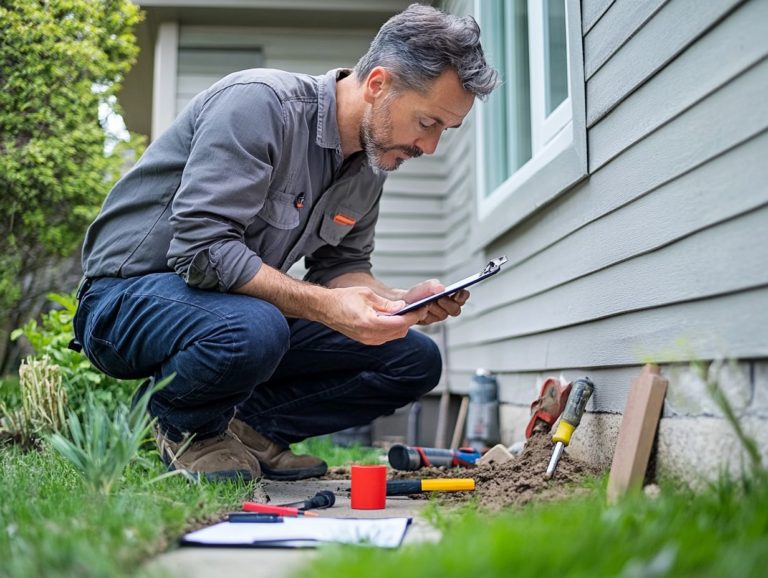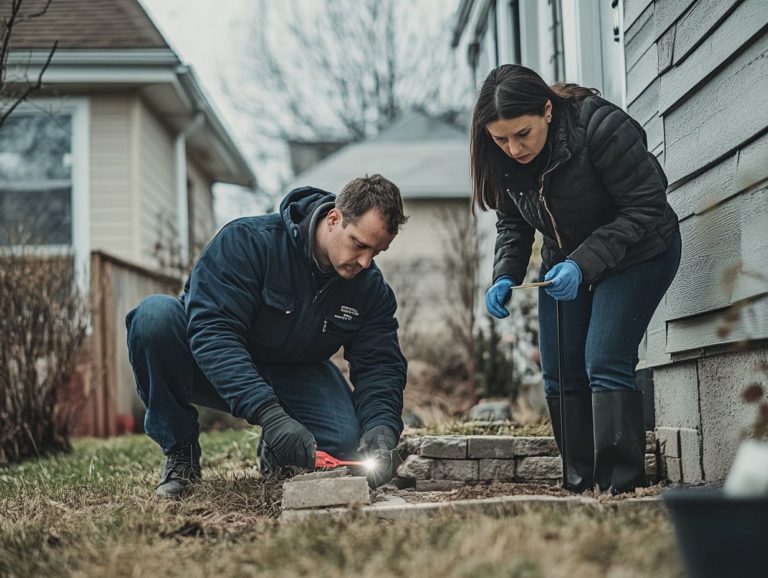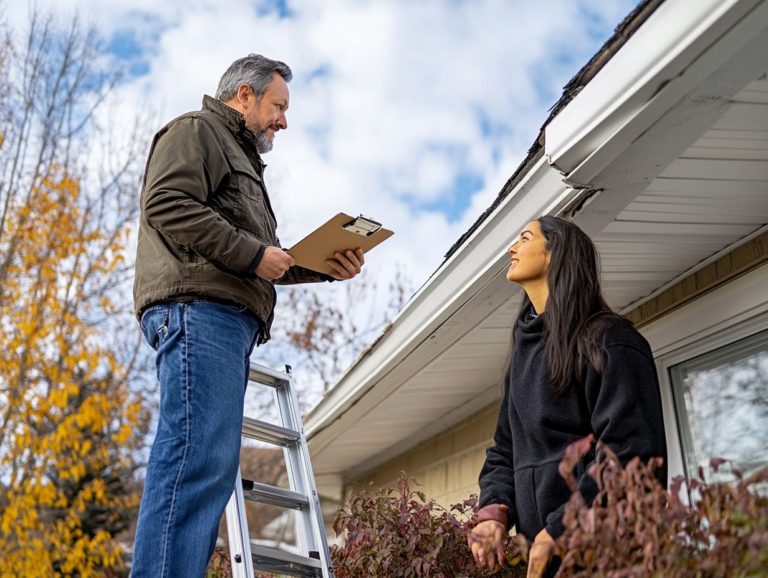Understanding Home Inspection Standards
When you set out to purchase or sell a home, having a thorough understanding of the home inspection process is essential. This article delves into what a home inspection entails, outlining its definition, purpose, and various types available to you.
It covers industry standards, what to expect during the inspection, and how to interpret the resulting reports effectively. You’ll also find a discussion on key factors to consider when choosing a qualified inspector, along with the numerous benefits that home inspections provide for both buyers and sellers.
Get excited to discover key insights into this critical aspect of real estate transactions!
Contents
- Key Takeaways:
- What is a Home Inspection?
- Types of Home Inspections
- Standards for Home Inspections
- What to Expect During a Home Inspection
- Interpreting Home Inspection Reports
- Choosing a Qualified Home Inspector
- Benefits of Home Inspections
- Frequently Asked Questions
- What are home inspection standards?
- Why is it important to understand home inspection standards?
- Who Sets the Standards for Home Inspections?
- What Do Home Inspection Standards Cover?
- Are Home Inspection Standards the Same in All States?
- Can Home Inspectors Go Outside the Scope of Home Inspection Standards?
Key Takeaways:
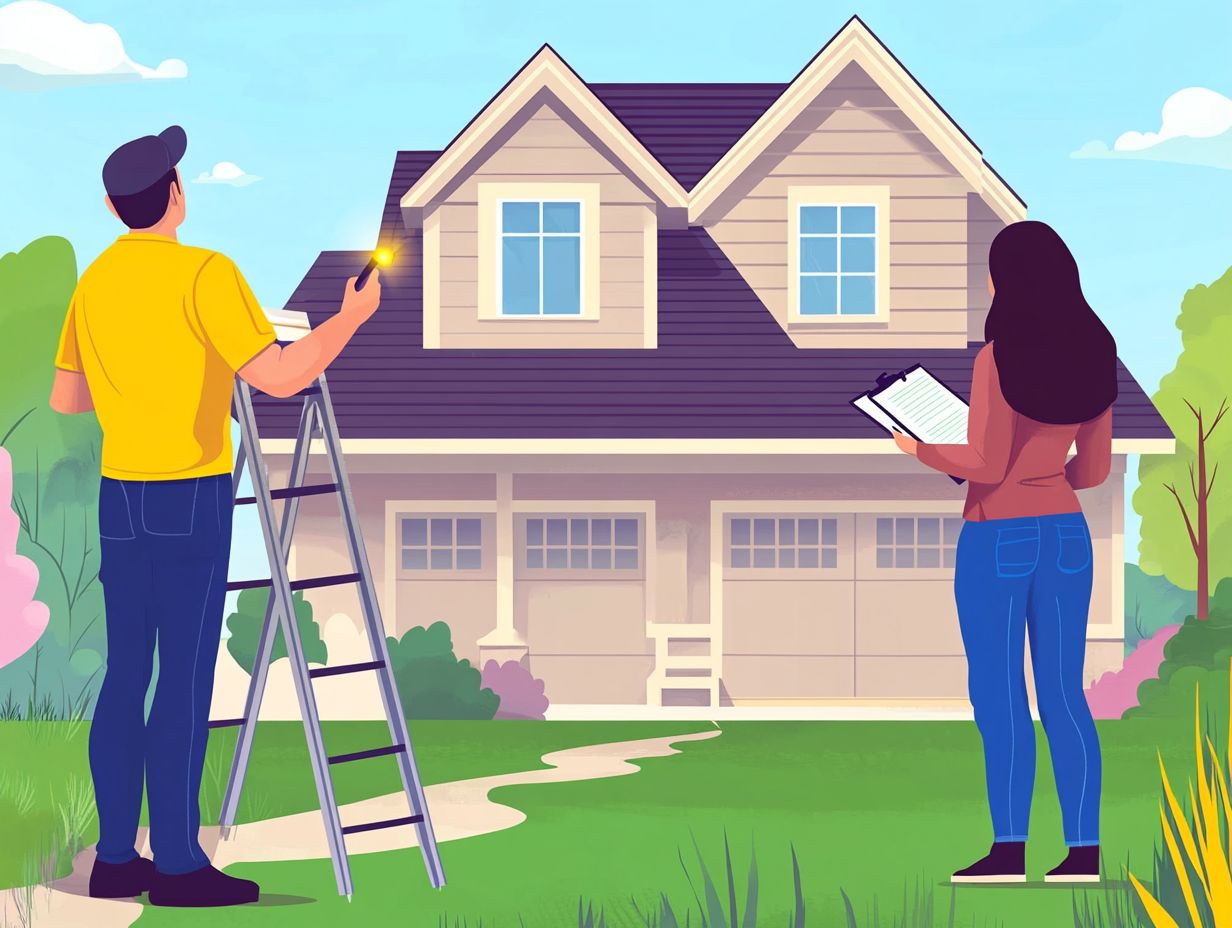
Understanding home inspection standards is crucial for both buyers and sellers to ensure a thorough evaluation of a property. Home inspection reports can be complex, but understanding the home inspection report and knowing common terminology and ratings helps buyers make informed decisions. When choosing a home inspector, consider their qualifications and experience to ensure a reliable inspection.
What is a Home Inspection?
A home inspection is a careful check-up of a residential property, typically carried out by a qualified home inspector. This process assesses the overall condition of the property and identifies material defects or safety concerns that could impact its value.
The inspection covers a range of systems, including heating, ventilation, and air conditioning (HVAC), plumbing, and electrical systems, along with critical structural elements like the foundation and roof.
Throughout this process, adherence to inspection standards and building codes is essential. For more information, check out what to know about home inspection policies, as this ensures a comprehensive assessment that safeguards the interests of both homebuyers and sellers.
Definition and Purpose
The definition and purpose of a home inspection center around ensuring the safety and integrity of a residential property. This offers invaluable insights for potential buyers and sellers.
This essential process also involves a careful evaluation of the property, allowing certified inspectors to uncover hidden issues that could pose safety risks or compromise the home s overall condition.
By identifying concerns such as electrical faults, plumbing deficiencies, or structural instabilities, the inspection fosters knowledge-based decision-making. With these insights, you can negotiate repairs or adjustments, ultimately boosting your confidence in your investment.
For sellers, act now to address these issues. Proactive measures can enhance property value and expedite the sale process, ensuring peace of mind for everyone involved.
Types of Home Inspections
Home inspections can be divided into two main categories: general inspections and specialized inspections, each playing a distinct role in assessing residential properties.
General inspections offer a comprehensive overview, examining various systems and components, including HVAC, plumbing, and electrical systems.
Specialized inspections focus on specific areas that may need a closer look, such as roofing, foundation issues, or environmental hazards.
General Inspections vs. Specialized Inspections
General inspections provide a broad overview of a residential property, while specialized inspections dig deeper into specific issues, ensuring a thorough evaluation.
This distinction is vital for prospective buyers and homeowners, as the outcomes of each inspection type can significantly influence your decision-making process.
While general inspections cover essential systems like roofing, plumbing, and electrical components, specialized inspections target specific concerns such as mold infestations, pest damage, or structural integrity.
These targeted assessments provide a detailed analysis, uncovering potential hidden risks that a standard evaluation might miss. By understanding the implications of each inspection type, you can make informed choices about property investments, ultimately protecting your future home from unforeseen complications.
Standards for Home Inspections

Standards for home inspections are set by esteemed industry organizations like the American Society of Home Inspectors (ASHI) and the International Association of Certified Home Inspectors (InterNACHI). To learn more about these protocols, understanding the basics of home inspections can serve as a helpful roadmap for inspectors, ensuring a consistent and reliable evaluation of residential properties.
You’ll find that these standards dictate not only the scope of the inspection process but also touch on ethics, client confidentiality, and the critical need to adhere to understanding the process of home inspections and local building codes.
Industry Standards and Regulations
Understanding industry standards and regulations is essential for ensuring that home inspections are carried out with professionalism and integrity. For more insights, check out our guide on understanding home inspector qualifications. This promotes trust and enhances safety in real estate transactions.
Organizations such as ASHI (American Society of Home Inspectors) and InterNACHI (International Association of Certified Home Inspectors) are essential for establishing these standards. By offering comprehensive training and certification programs, they arm inspectors with the skills needed to pinpoint potential issues within a property.
These organizations uphold a strict code of ethics, ensuring that inspectors always prioritize their clients’ interests. Their influence significantly elevates the quality and reliability of home inspections, instilling greater confidence in both buyers and sellers.
This commitment sets a high standard in the industry, leading to more informed real estate decisions.
What to Expect During a Home Inspection
Don’t wait! A thorough home inspection could save you from costly repairs later. During a home inspection, you can expect a careful visual examination of the property, carried out by a qualified home inspector equipped with specialized tools to assess various systems, including plumbing, electrical, and HVAC.
This careful process typically involves evaluating the structural integrity, identifying safety concerns, and examining the overall condition of the property.
Following the inspection, you’ll receive a detailed report that outlines the findings, highlights any potential issues, and provides recommendations for necessary repairs or maintenance.
Process and Procedures
The inspection process encompasses several essential procedures designed to ensure a comprehensive understanding of the property and its systems, ultimately safeguarding your investment’s safety and value.
It begins with an initial assessment, where trained inspectors carefully evaluate various elements such as the structure, plumbing, electrical systems, and safety features. Once the visual inspection is complete, they proceed to perform specific tests, including checking moisture levels, verifying appliance functionality, and assessing the stability of the roof and foundation.
Throughout this thorough examination, detailed notes are documented regarding any anomalies or concerns. From this, a comprehensive report is generated that outlines the findings and offers recommendations for necessary repairs. Inspectors not only look for problems but also offer tips to maintain your home s value.
Interpreting Home Inspection Reports
Interpreting home inspection reports is an invaluable skill for you as a homebuyer. These documents hold crucial insights about the property’s condition, potential material defects, and safety concerns that could affect your investment.
Familiarizing yourself with the common terminology found in inspection reports such as ratings and descriptions of various systems and components is essential. This understanding empowers you to make informed decisions about property maintenance and any significant repairs that may arise in the future.
For further clarity, discuss your report with your inspector. They can provide valuable insights to help you navigate any concerns effectively.
Understanding Common Terminology and Ratings
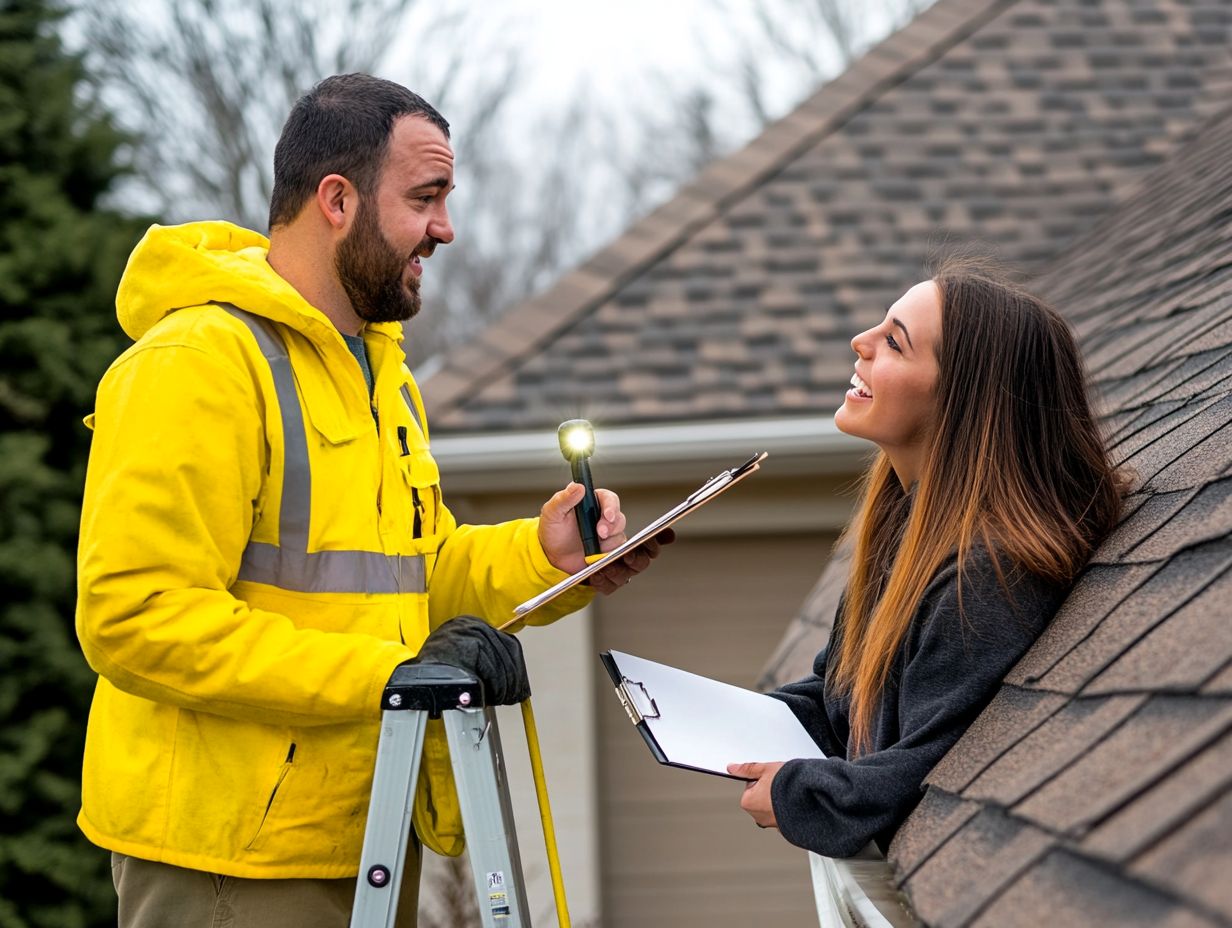
Understanding the common terminology and ratings in home inspection reports is crucial for you to accurately interpret the findings. This knowledge helps you make informed decisions about property maintenance.
These reports often feature key terms like “acceptable,” “deficient,” and “recommended maintenance.” Each carries significant implications for assessing a property’s condition. For example, a ‘deficient’ rating generally signals a serious issue that demands your immediate attention. In contrast, ‘acceptable’ suggests satisfactory conditions, offering you some peace of mind.
Clear communication in these reports is essential. It allows you to prioritize repairs effectively and plan your budget for necessary upgrades. Ultimately, becoming familiar with these terms aids in taking immediate actions and enhances your long-term stewardship of the property.
Choosing a Qualified Home Inspector
Selecting a qualified home inspector is crucial for a successful home inspection. This professional significantly contributes to ensuring the integrity and safety of your residential property.
When making your choice, consider the inspector’s credentials, experience, and commitment to ongoing education. Pay attention to their adherence to inspection ethics and client confidentiality, as these elements are vital in fostering trust throughout the property evaluation process.
Factors to Consider and Questions to Ask
When selecting a qualified home inspector, you ll want to consider several key factors and ask the right questions to ensure you’re making an informed choice.
- Experience: Experience in the field is crucial, as it typically reflects a deep understanding of various structural issues.
- Certifications: Certifications from respected organizations can provide you with peace of mind regarding the inspector’s qualifications.
- Customer Reviews: Customer reviews are invaluable; they offer insights into the inspector s reliability and thoroughness.
- Questions to Ask: Be sure to inquire about their level of experience, relevant certifications, and the types of properties they have inspected.
- Ethics: Don t hesitate to ask about their approach to ethics and conflict of interest. This can reveal a great deal about their professionalism and commitment to honesty throughout the inspection process.
Benefits of Home Inspections
Home inspections present a wealth of advantages for both buyers and sellers. They ensure that everyone involved is thoroughly informed about the property’s condition before sealing the deal.
These inspections can reveal hidden issues that could affect property value. They also bring safety concerns to light and offer actionable recommendations to remedy material defects.
This approach not only promotes transparency but also builds trust throughout the entire buying and selling journey.
Why Home Inspections are Important for Buyers and Sellers
Home inspections are essential for you, whether you’re buying or selling a property. They provide critical insights into the condition of the home. This helps you avoid potential disputes down the line and ensures fair negotiations.
If you re a buyer, these assessments reveal hidden issues that could impact your decision-making. This knowledge gives you the power to make informed choices and even renegotiate terms based on any necessary repairs.
For sellers, the feedback from an inspection is invaluable. It guides you in making needed repairs before listing, enhancing your property’s marketability. Taking this proactive approach builds buyer confidence and facilitates smoother transactions.
Ultimately, prioritizing thorough inspections leads to enhanced safety and peace of mind, making the property transaction process rewarding for both you and the other party involved.
Frequently Asked Questions

What are home inspection standards?
Home inspection standards are a set of guidelines and procedures that professional home inspectors follow to thoroughly assess the condition of a property, ensuring a clear understanding of home inspection standards.
Why is it important to understand home inspection standards?
Understanding home inspection standards and practices is crucial for both buyers and sellers. It ensures that the inspection is conducted accurately and fairly, providing a detailed report of the property’s condition.
Do you have more questions? Feel free to reach out for further information!
Who Sets the Standards for Home Inspections?
Various organizations set the standards for home inspections. The American Society of Home Inspectors (ASHI) and the International Association of Certified Home Inspectors (InterNACHI) are two key players in understanding the home inspector’s role.
What Do Home Inspection Standards Cover?
Home inspection standards examine many parts of a property. This includes the foundation, roof, plumbing, and electrical systems.
They also identify safety hazards and potential future issues.
Are Home Inspection Standards the Same in All States?
No, home inspection standards differ from state to state. Some states have specific guidelines, while others follow national standards from organizations like ASHI or InterNACHI. For a deeper insight, consider reviewing understanding the home inspection process.
Can Home Inspectors Go Outside the Scope of Home Inspection Standards?
Home inspectors must follow the standards set by their organization and state laws. They can offer extra services, like testing for mold or checking energy efficiency, but their inspections must stick to the approved standards.


